- Clone
- Poly21460 (See other available formats)
- Regulatory Status
- RUO
- Other Names
- Ganglioside, GM1, ganglio-N-tetraosylceramide
- Isotype
- Rabbit Polyclonal IgG
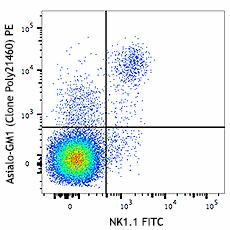
-

C57BL/6 mouse splenocytes were stained with NK1.1 FITC and anti-Asialo-GM1 (clone Poly21460) PE.
| Cat # | Size | Price | Quantity Check Availability | ||
|---|---|---|---|---|---|
| 146007 | 25 µg | $153.00 | |||
| 146008 | 100 µg | $414.00 | |||
GM1 is a ganglioside, a type of glycosphingolipid with a single sialic acid group. Asialo-GM1 is a GM1 derivative without a sialic acid group. It is expressed on NK cells, basophils, monocytes/macrophages, and T cells. It is particularly expressed on very early thymocytes, but the expression decreases as the cells mature and become Thy-1+. The highest expression is detected on neuronal tissues. This molecule has been shown to be involved in microbial pathogenesis. Antibodies specific for Asialo-GM1 are elevated in dementia, lupus, and Guillain-Barré syndrome.
Product Details
- Verified Reactivity
- Mouse, Rat
- Antibody Type
- Polyclonal
- Host Species
- Rabbit
- Immunogen
- Asialo-GM1
- Formulation
- Phosphate-buffered solution, pH 7.2, containing 0.09% sodium azide.
- Preparation
- The antibody was purified by affinity chromatography and conjugated with PE under optimal conditions.
- Concentration
- 0.2 mg/ml
- Application
-
FC - Quality tested
- Recommended Usage
-
Each lot of this antibody is quality control tested by immunofluorescent staining with flow cytometric analysis. For flow cytometric staining, the suggested use of this reagent is ≤0.25 µg per million cells in 100 µl volume. It is recommended that the reagent be titrated for optimal performance for each application.
- Excitation Laser
-
Blue Laser (488 nm)
Green Laser (532 nm)/Yellow-Green Laser (561 nm)
- Application Notes
-
This antibody recognizes asialo-GM1. It does not react with other glycolipids, such as GM1 and Asialo-GM2.
This antibody can partially block IL-12 induced IFN-? production but does not affect other systemic action of IL-12.
This product may contain other non-IgG subtypes. -
Application References
(PubMed link indicates BioLegend citation) -
- Naiki M, et al. 1974. J. Immunol. 113:84.
- Kasai M, et al. 1981. Nature. 291:334. (Depletion)
- Nishikado H, et al. 2011. J. Immunol. 186:5766. (Depletion)
- Zhou G, et al. 2013. Eur. J. Immunol. 43:929. (Depletion)
- Product Citations
-
- RRID
-
AB_2728170 (BioLegend Cat. No. 146007)
AB_2728170 (BioLegend Cat. No. 146008)
Antigen Details
- Structure
- Asialo-GM1 is a GM1 derivative without a sialic acid group, with the structure: βDGalp(1-3)βDGalpNAc(1-4)βDGalp(1-4)βDGlcp(1-1)Cer
- Distribution
-
NK cells, basophils, splenic T lymphocytes, highest concentrations on neurons
- Function
- Supports cellular identification, neuronal plasticity, and repair mechanisms
- Interaction
- Facilitates cellular recognition and cell-to-cell communication
- Ligand/Receptor
- Ligand for cholera toxin
- Cell Type
- NK cells, Basophils, T cells, Neurons
- Biology Area
- Cell Biology, Immunology, Innate Immunity, Signal Transduction
- Antigen References
-
1. Stein-Douglas K, et al. 1979. J. Exp. Med. 143:822.
2. Kasai M, et al. 1980. Eur. J. Immunol. 10:175.
3. Young WW Jr, et al. 1980. J. Immunol. 124:199.
4. Bansal AS, et al. 1994. J. Clin. Path. 47:300. - Gene ID
- NA
- UniProt
- View information about Asialo-GM1 on UniProt.org
Other Formats
View All Asialo-GM1 Reagents Request Custom Conjugation| Description | Clone | Applications |
|---|---|---|
| Ultra-LEAF™ Purified anti-Asialo-GM1 | Poly21460 | FC,Depletion |
| Alexa Fluor® 647 anti-Asialo-GM1 | Poly21460 | FC |
| FITC anti-Asialo-GM1 | Poly21460 | FC |
| PerCP/Cyanine5.5 anti-Asialo-GM1 | Poly21460 | FC |
| PE anti-Asialo-GM1 | Poly21460 | FC |
Compare Data Across All Formats
This data display is provided for general comparisons between formats.
Your actual data may vary due to variations in samples, target cells, instruments and their settings, staining conditions, and other factors.
If you need assistance with selecting the best format contact our expert technical support team.
-
Ultra-LEAF™ Purified anti-Asialo-GM1

C57BL/6 mouse splenocytes were stained with Ultra-LEAF™ puri... -
Alexa Fluor® 647 anti-Asialo-GM1
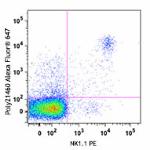
C57BL/6 mouse splenocytes were stained with NK1.1 PE and ant... -
FITC anti-Asialo-GM1
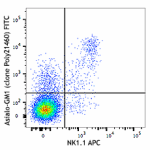
C57BL/6 mouse splenocytes were stained with NK1.1 APC and an... -
PerCP/Cyanine5.5 anti-Asialo-GM1
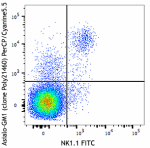
C57BL/6 mouse splenocytes were stained with NK1.1 FITC and a... -
PE anti-Asialo-GM1
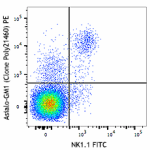
C57BL/6 mouse splenocytes were stained with NK1.1 FITC and a...
